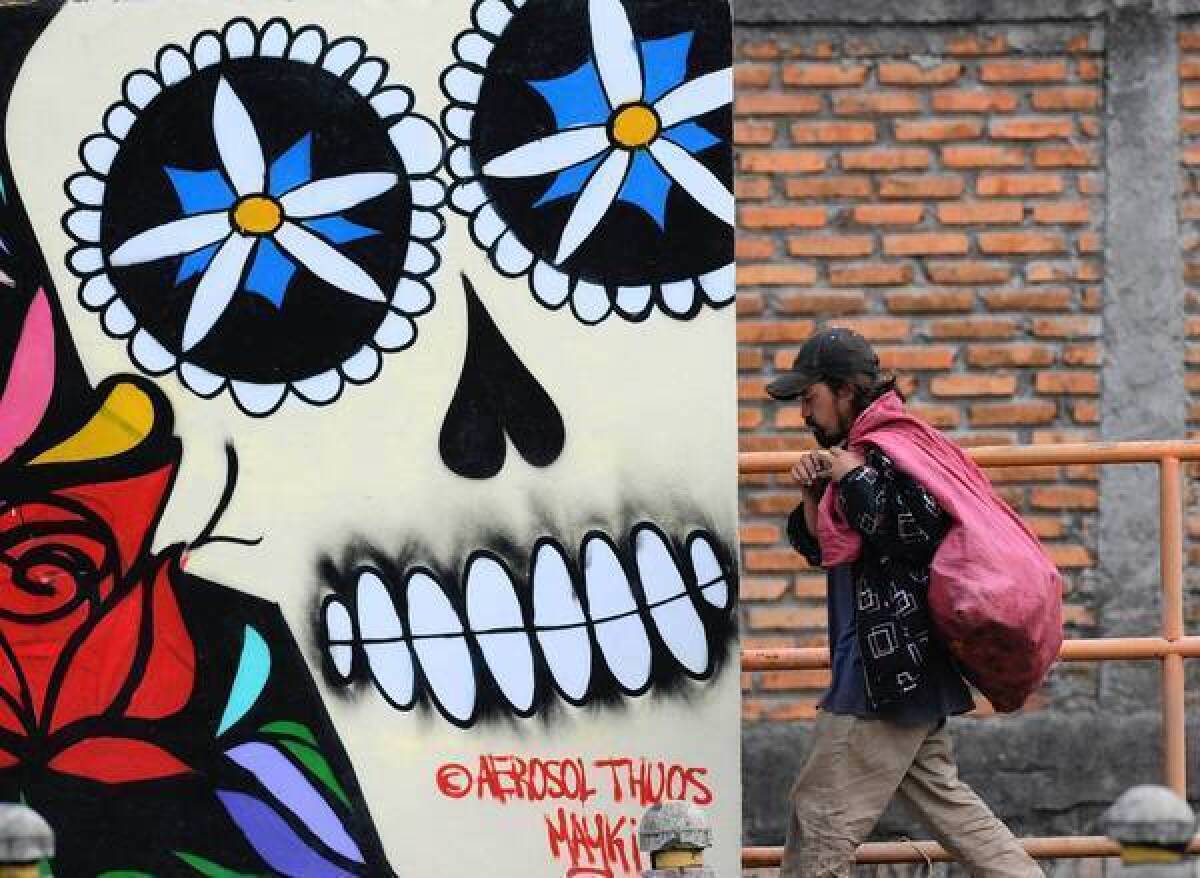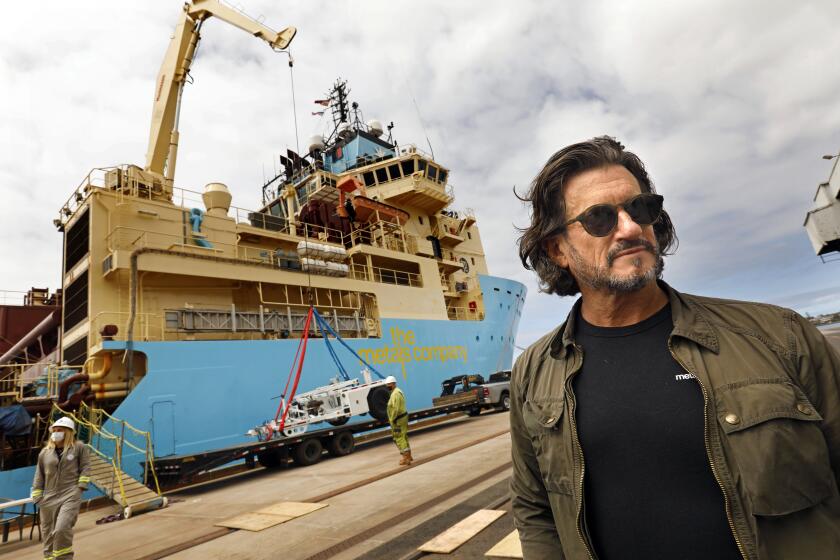U.S. gingerly expands security role in Central America

VILLA NUEVA, Guatemala — Lusvin Jerez has seen, firsthand, the way the U.S. has intervened in the security affairs of his obscure corner of Central America, 1,300 miles from the Texas border.
He can’t get enough of it.
Jerez, 43, once sold home appliances in this violent, slum-dotted city on the outskirts of Guatemala City, but he grew tired of the extortion payments to gang members. So in January, he took a government job overseeing Villa Nueva’s new citywide video security system, developed with U.S. dollars and expertise, one of myriad examples of Washington’s involvement to help stabilize the violence-racked region. The help from the United States is the most since the end of the Cold War.
When Jerez talks about the U.S. influence in Guatemala, it isn’t to dredge up the facts of the U.S.-backed coup d’etat in 1954, or the covert CIA support for the brutally repressive right-wing military during the country’s 36-year civil war, which ended in 1996.
Instead, he will tell you about crime being down more than 30% through October, compared with the same period last year.
“What the Americans are offering us is incredible,” he said, showing off the system’s 85 surveillance-camera nerve center. “And we’re hoping we’ll get more help.”
Not everyone, however, is delighted with Washington’s expanded role in Central America. Many in Honduras were enraged when the national police, working with the U.S. Drug Enforcement Administration, fired on a small boat in the remote Mosquitia area, killing four people. Honduran authorities say drugs were being smuggled on the boat. Locals, many of them Miskito Indians, said the passengers were civilians, and have demanded that the DEA get out.
A local gang problem and the expanding presence of Mexican drug cartels have helped bring about the renewed U.S. focus on the region. But the increasing involvement is complicated by history. In the latter part of the 20th century, American support for the region’s right-wing governments was applauded by some, yet loathed by others, who, among other things, noted that fighting communism often meant partnering with an unsavory cast of characters.
Today, as the U.S. forges closer regional alliances, critics worry that it will again team up with unreliable governments and police and military institutions with troubling human rights records, a kind of rerun of the 1980s.
Those concerns have served to limit the expansion of U.S. involvement. That, in turn, has prompted criticism that the U.S. is not doing enough, given the severity of the problems.
U.S. officials estimate that 84% of U.S.-bound cocaine passes through Central America. In Guatemala, the Congressional Research Service recently noted, at least 40% of the country is believed to be under the “effective control” of drug traffickers. Homicide rates in Guatemala, El Salvador and Honduras are significantly higher than in violence-plagued Mexico, yet few cases result in convictions.
Since 2007, Congress has appropriated $496 million for an aid program, the Central America Regional Security Initiative. The Department of Defense has kicked in $160 million of “counter-narcotics support” funds over the same period.
Bruce Bagley, a Latin America expert at the University of Miami, says those are paltry numbers compared with the $1.9 billion in dedicated drug-war funds provided to Mexico since 2007, or the roughly $8 billion given to Colombia in the decade-long aid program that had some success in rolling back cartel influence there.
The disparity, Bagley argues, is due in part to U.S. domestic political realities: The left is historically wary of U.S. intervention in the region while the right is trying to rein in deficit spending.
Bagley said U.S. lawmakers are also hesitant to assist governments that are too weak or corrupt to be able to spend the aid well.
“We’re not so sure how much we can trust these countries,” Bagley said.
Central American governments were already struggling with the legacy of poverty, inequality, civil warfare and dictatorships when drug runners, with their corrupting cash, came roaring through the region in the late 2000s, seeking to avoid a robust U.S.-led interdiction program in the Caribbean.
In response, the U.S. military’s Southern Command, or Southcom, stepped up the policing of trafficking routes. In the first 10 months of this year, Southcom says the program disrupted the flow of 120 tons of cocaine and 25,250 pounds of marijuana.
In recent years, the U.S. has also showered Central American governments with hardware to help stem the flow of drugs: aircraft, boats, X-ray cargo scanners, ballistic vests and wiretapping centers. Villa Nueva’s video surveillance system is one of several projects meant to help fight the explosion in violent crime that has destabilized local governments and prompted some residents to head north toward the U.S., often illegally, in search of peace.
But the crime-fighting initiative goes far beyond surveillance cameras. The U.S. is also investing in civic projects under the theory that the drug war here cannot be won without more skilled and trustworthy police and prosecutors, along with an engaged citizenry that has reason to hope.
On a recent visit to the neighborhood of Bucaro — a dusty, concrete warren of poverty beset with drug and gang problems — officials detailed plans for a partially American-funded public school campus, basketball court and commercial plaza. At a community center across town, U.S. “security initiative” tax dollars provide poor children with alternatives to crime such as break-dancing performances and clown and juggling programs.
Here, as in Mexico, security funds are also being used to impart both basic and advanced skills to police. Specialized “vetted” law enforcement units, subjected to background checks and polygraph tests, work with American immigration and policing agencies.
But the United States’ list of potential security partners is not encouraging.
In El Salvador, politicians and police are believed to be tied to the criminal groups with roots in the military and paramilitary forces that sprang up during the country’s civil war.
Guatemala’s military, which is increasingly being called upon to keep the peace here, had a notorious human rights record during its own civil war, and nonmilitary security forces are also a cause for concern: In March, Guatemala’s former national police chief Marlene Blanco was arrested on suspicion of contributing to the extrajudicial slaying of gang members.
In Honduras, meanwhile, senior government officials participated in or supported the 2009 coup that overthrew a democratically elected president. Security forces are notoriously corrupt; the judiciary, largely incapable of administering justice. Some members of Congress are said to be working with cartels.
The Honduran police chief, Juan Carlos “El Tigre” Bonilla, has been connected to death squads that allegedly went after gang members and kidnappers in a “social cleansing” campaign, according to investigators from the U.S. Congress, which in August restricted aid to the Honduran police.
In addition to the boat incident, an American DEA agent in June killed a suspected drug trafficker during a raid using U.S. helicopters in northern Honduras. In July, two American DEA agents killed a man they described as a suspected drug trafficker who emerged from a cocaine-ferrying plane that had crash-landed, the agency said.
Such shootings highlight how potentially dangerous it is for U.S. operatives to dig deeper in the region with unreliable partners.
Bertha Oliva, a veteran Honduran human rights activist, said that although drug-trafficking is a severe problem, “it is being used as a pretext to militarize the country, with the U.S. leading the charge.”
Meanwhile, the Obama administration’s security funding request for the region is $107 million for fiscal 2013, more than 20% less than the appropriation for fiscal 2012. Sentiments like Oliva’s will probably make it harder for those who would like to see more funding and involvement in Central America.
But even if they did get more money, it’s not clear that the targeted countries would be capable of spending it effectively.
State Department officials in Guatemala said they recently put 85 members of the country’s national police through the American-style vetting process.
Six of them passed.
Fausset reported from Villa Nueva, Guatemala, and Wilkinson from Tegucigalpa, Honduras.
More to Read
Sign up for Essential California
The most important California stories and recommendations in your inbox every morning.
You may occasionally receive promotional content from the Los Angeles Times.






